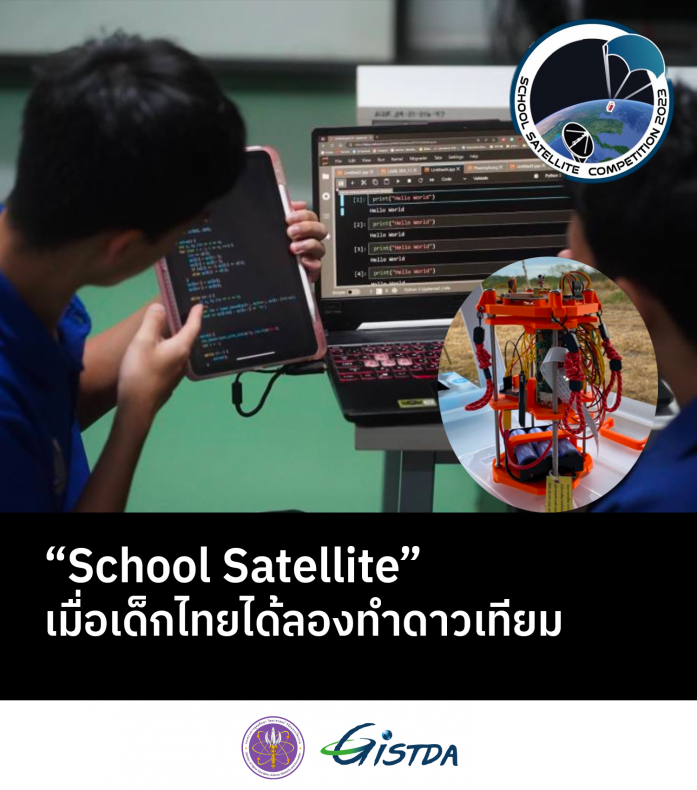“School Satellite” เมื่อเด็กไทยได้ลองทำดาวเทียม
หากพูดถึงเรื่องราวของดาวเทียม หลายคนอาจจำชื่อ ‘ไทยโชต’ หรือ ‘ธีออส’ ในฐานะดาวเทียมสำรวจทรัพยากรดวงแรกของไทย หรือดาวเทียมต่าง ๆ จากนานาประเทศ ตามที่ปรากฏในหน้าหนังสือเรียน
แต่จะเป็นอย่างไร หากเด็กไทยสามารถสานต่อความสนใจจากเรื่องราวในหน้าหนังสือเรียน สู่การเรียนรู้พื้นฐานการพัฒนาดาวเทียม จากวิศวกรที่เชี่ยวชาญ และมีทรัพยากรให้ได้ลองออกแบบและลงมือทำจริง?
ในอดีต การเข้าถึงเทคโนโลยีดาวเทียมของบุคคลทั่วไปคือเรื่องราวที่แทบเป็นไปไม่ได้ เนื่องจากดาวเทียมถือเป็นเทคโนโลยีขั้นสูง ที่ต้องอาศัยองค์ความรู้ บุคลากร และงบประมาณค่อนข้างสูง เพื่อออกแบบ พัฒนา และประกอบดาวเทียมขึ้นมาหนึ่งดวง ก่อนนำส่งขึ้นสู่วงโคจรที่ต้องการ
เมื่อเวลาผ่านไป ความสามารถในการเข้าถึงองค์ความรู้ และการพัฒนาบุคลากรให้มีศักยภาพเพียงพอ ทำให้ประเทศและหน่วยงานต่าง ๆ สามารถพัฒนาดาวเทียมเป็นของตนเองได้ โดยมีราคาที่ถูกลง พร้อมกับพัฒนาขีดความสามารถของการสำรวจอววกาศ ทั้งในด้านองค์ความรู้และบุคลาการในประเทศได้
GISTDA หรือ สำนักงานพัฒนาเทคโนโลยีอวกาศและภูมิสารสนเทศ (องค์การมหาชน) ได้ส่งวิศวกรไทยไปรับการถ่ายทอดองค์ความรู้ในการพัฒนาดาวเทียม และร่วมออกแบบดาวเทียม THEOS-2A ดาวเทียมสำรวจทรัพยากรมาตรฐานระดับ Industrial Grade ดวงแรก ซึ่งมีกำหนดออกเดินทางสู่อวกาศในช่วงต้นปี 2024
เมื่อประเทศไทยมีวิศวกรดาวเทียมที่มีองค์ความรู้และความสามารถทัดเทียมนานาประเทศ GISTDA จึงได้เริ่มโครงการ ‘School Satellite’ เพื่อส่งต่อองค์ความรู้ ทักษะ และกระบวนการพัฒนาดาวเทียม ให้แก่นักเรียนและนักศึกษาที่สนใจในเทคโนโลยีอวกาศ โดยเริ่มต้นขึ้นตั้งแต่ช่วงกลางปี 2023 ที่ผ่านมา
ในโครงการนี้ นักเรียนนักศึกษาที่ผ่านการคัดเลือกทั้ง 10 ทีม ได้มีโอกาสเสนอแนวคิดการพัฒนาดาวเทียมสำหรับทำภารกิจสำรวจดาวอังคาร ก่อนเข้าสู่กระบวนการเรียนรู้พื้นฐานในการทำดาวเทียม ตั้งแต่โครงสร้าง ระบบพื้นฐาน ซอฟท์แวร์ การปฏิบัติงาน และการทดสอบ จากทีมวิศวกรของดาวเทียม THEOS-2A
เมื่อรับการถ่ายทอดองค์ความรู้ดังกล่าวแล้ว ทีมที่ผ่านการคัดเลือกจะได้พัฒนาต้นแบบดาวเทียมของตนเอง ผ่านอุปกรณ์ที่สามารถหาได้โดยทั่วไปตามท้องตลาดและโปรแกรมแบบ Open Source พร้อมกับได้โอกาสนำดาวเทียมไปทดสอบที่ศูนย์ประกอบและทดสอบดาวเทียมแห่งชาติ หรือ Satellite Assembly Integration and Testing Center ที่อำเภอศรีราชา จังหวัดชลบุรี แบบเดียวกับที่ดาวเทียม THEOS-2A ได้รับการทดสอบจริง ก่อนนำดาวเทียมไปทดสอบจริงในพื้นที่โครงการนวัตกรรมระเบียงเศรษฐกิจภาคตะวันออก (วังจันทร์วัลเลย์) ระหว่างวันที่ 18-20 มกราคมนี้
สิ่งสำคัญที่จะเกิดขึ้นจากโครงการนี้ คือการที่นักเรียนระดับมัธยม หรือนักศึกษาในระดับมหาวิทยาลัย สามารถเข้าถึงเทคโนโลยีดาวเทียมได้ พร้อมกับได้รับองค์ความรู้พื้นฐานสำหรับการออกแบบและพัฒนาดาวเทียมจากวิศวกรผู้เชี่ยวชาญ ถือเป็นประโยชน์แก่น้อง ๆ ที่มีความสนใจในสายงานนี้ และยังสร้างความตระหนักรู้ถึงความหลากหลายของงานในอุตสาหกรรมอวกาศได้ในเวลาเดียวกัน
ในยุคที่ทุกประเทศกำลังมองขึ้นไปยังโอกาสบนอวกาศที่กว้างใหญ่ โครงการ School Satellite จะเป็นส่วนหนึ่งของการพัฒนาและสร้างแรงบันดาลใจให้กับบุคลากรรุ่นใหม่ เพื่อเป็นกำลังสำคัญเพื่อขับเคลื่อนกิจการอวกาศในประเทศไทยได้ในอนาคต
School Satellite: Opportunity for young Thais to develop satellites!
'THEOS' or 'Thaichote' was well known for being the first Earth Observation of Thailand. The mission was launched into orbit in 2008 and served the purpose of inspiring many young Thais to pursue a career in space.
But imagine what would happen if young students could get their hands-on experience with satellite development, learning from a team of engineers who had been learning and gathering satellite knowledge from an organization with expertise?
In the past, accessing satellite technology was almost impossible for ordinary people. It was classified as a high-end technology, which contributes to its expensive price tag, as well as the requirement of sophisticated knowledge, and a team of skilled engineers to design and develop.
Nowadays, space technology and the knowledge associated with the design and development of satellites have been made accessible to many nations and organizations. This has been one of the factors contributing to the rapid growth of the space industry and satellite development of many nations worldwide. This made the cost of each satellite cheaper, while also strengthening the workforce within each country's space industry.
In Thailand, the Geo-Informatics and Space Technology Development Agency or GISTDA sent a team of Thai engineers to learn and develop a small satellite called THEOS-2A with Surrey Satellite Technology, a satellite company based in the United Kingdom owned by Airbus Defence and Space. THEOS-2A will be the first industrial-grade Earth-observing satellite designed and developed by a Thai engineer, with a planned launch date in 2024.
GISTDA decided that the knowledge learned by engineers involved in the THEOS-2A mission will be shared with young students who are interested in satellite development. This kickstarted the 'School Satellite' project in June 2023, where 10 teams of students in Secondary Schools and Universities will take part in the ideation process of a satellite mission. Followed by the basics of satellite operation, design, integration, power, communication, and many essential systems necessary for the entire mission to be operational.
All 10 teams will then have an opportunity to develop their satellite for a test launch with GISTDA engineers, along with a chance to learn the process of satellite test at the Assembly Integration and Testing Center (AIT) based in Sriracha, Chonburi. This is Thailand's first satellite assembly and testing facility and has been responsible for the testing of the THEOS-2A mission before being sent to the launch vehicle in India.
The experiences learned from participating in the school satellite project will be crucial for students who have a keen interest in satellite development. It will also inspire many more who want to develop their idea into reality, which could contribute to humanity's pursuit of exploring and understanding the vastness of our universe.
The final round of the School Satellite project will be held on January 17-20, with all ten finalists conducting a final check of their satellite, before the test launch event at Wangchan Valley (Eastern Economic Corridor of Innovation Project).
